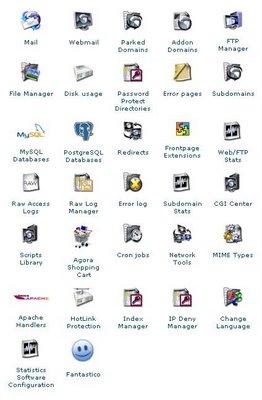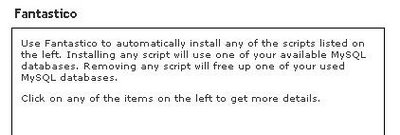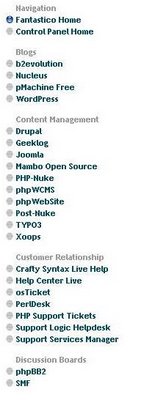- Folksonomies 2.0 - The Chaotic Order
- The Evolution of Social Tagging
- Improving Social Bookmarking Granularity
30 March 2006
Interested in Folksonomies?
29 March 2006
Taxonomy of Legal Blogs
3L Epiphany wrote a very interesting taxonomy of legal bogs. On March 17th, 2006, the list was up to 686 legal blogs, all categorized and sorted. A definite resource for anyone interested to witness how many law blogs, or blawgs, exist out there.
Office 2.0 Applications
Office 2.0 applications enable users to use software online instead of software installed on their desktops. There is now an impressive variety of such applications. Thanks to this list compiled by IT | Redux, you now have access to an extensive directory of Office 2.0 applications with corresponding links to application web sites and reviews by Solution Watch, TechCrunch and IT | Redux.
28 March 2006
Gartner Predictions on RSS, Corporate Blogging and Wikis
 The Gartner Hype Cycle is a well know, evolution in time depiction of technology trends:
The Gartner Hype Cycle is a well know, evolution in time depiction of technology trends: One thing I can't figure out is why they left out social tagging from their graph...
One thing I can't figure out is why they left out social tagging from their graph...23 March 2006
Solving Corporate Email Overload - with blogs
Because these blogs are:
- Searchable - both as part of Search Collections and as a web page with a search function;
- Sorted - by definition, each blog will be created and used for one topic and purpose only, therefore the sorting and categorization will occur at the source instead of having thousand users trying to organize this massive traffic themselves in different ways;
- Archived - in the sense that the availability of blog posts will go back farther than the email account creation date. This limitation does not allow users to efficiently go back in time and search. Blogs solve this problem;
- Syndicated - RSS feeds will be associated with each blog, enabling mandatory (based on user category) and optional (based on user interest) subscription;
22 March 2006
The Web 2.0 Enabled Law Firm
For the past several months, I have been diligently exploring how Web 2.0 technologies could better support the work of lawyers. I'm happy to report my findings in this discussion paper, albeit in a particular context, using a TiddlyWiki. If you are interested in what it takes to write a document like this, make sure you check the About section in the paper.
Web 2.0 and the Legal Profession is also specifically discussed.
Comments and suggestions are welcome.
20 March 2006
Firefox 2.0 (Alpha) Released
19 March 2006
Over 3,000 People Have Bookmarked These Pages
Here is the list (the numbers were accurate when I wrote this post):
- Quick Online Tips: Absolutely Del.icio.us - Complete Tool Collection (10,855 bookmarks). Not suprisingly, the first resource is a page regularly updated about del.icio.us hacks, plugins, extensions and API's
- script.aculo.us - web 2.0 javascript (9907 bookmarks): "script.aculo.us provides you with easy-to-use, compatible and, ultimately, totally cool JavaScript libraries to
make your web sites and web applications fly, Web 2.0 style" - digg (7762 bookmarks): "Digg is a technology news website that employs non-hierarchical editorial control. With digg, users submit stories for review, but rather than allowing an editor to decide which stories go on the homepage, the users do"
- Last.fm (6961 bookmarks): "You get your own online music profile that you can fill up with the music you like. This information is used to create a personal radio station and to find users who are similar to you. Last.fm can even play you new artists and songs you might like"
- Writely - The Web Word Processor (6016 bookmarks): "Pick exactly who can access your documents. · Upload from Word/OpenOffice & save to your desktop. · Edit your documents anytime, from anywhere." Note: Writely has been purchased by Google
- Prototype JavaScript Framework: Class-style OO, Ajax, and more (5630 bookmarks): "Prototype is a JavaScript framework that aims to ease development of dynamic web applications. Featuring a unique, easy-to-use toolkit for class-driven development and the nicest Ajax library around, Prototype is quickly becoming the codebase of choice for the development of Web applications"
- The Best Web 2.0 Software of 2005 (5289 bookmarks): 2005 Review of the best software, by Dion Hinchliffe
- Yahoo! UI Library (4031 bookmarks): "The Yahoo! User Interface Library is a set of utilities and controls, written in JavaScript, for building richly interactive web applications using techniques such as DOM scripting, HTML and AJAX"
- WordPress › Free Blog Tool and Weblog Platform (3638 bookmarks): "WordPress is a state-of-the-art semantic personal publishing platform with a focus on aesthetics, web standards, and usability. What a mouthful. WordPress is both free and priceless at the same time"
- YouTube - Broadcast Yourself (3617 bookmarks): "Broadcast yourself. Watch and share your videos worldwide!"
- QuirksMode - for all your browser quirks (3560 bookmarks): "contains more than 150 pages with CSS and JavaScript tips and tricks, and is one of the best sources on the WWW for studying and defeating browser incompatibilities"
- TiddlyWiki - a reusable non-linear personal web notebook (3392 bookmarks): A free micro-content and object-oriented editing environment consisting of a JavaScript/HTML page - no software is needed. Note: I will soon publish a series of posts dedicated to TiddlyWikis - I have recently been experimenting with them and I think they are extraordinary
- Feed Icons - Help establish the new standard (3201 bookmarks): New standard icon to be used when identifying syndicated content
- Dojo - DojoToolkit.org (3030 bookmarks): "Dojo is the Open Source JavaScript toolkit that helps you build serious applications in less time. It fills in the gaps where JavaScript and browsers don't go quite far enough, and gives you powerful, portable, lightweight, and tested tools for constructing dynamic interfaces. Dojo lets you prototype interactive widgets quickly, animate transitions, and build Ajax requests with the most powerful and easiest to use abstractions available"
Canoë | Mainstream Media Goes Blogging
Some room for improvement:
- Canoë ought to implement trackbacks in their blogs. Only comments seem to be supported at this time;
- Permalinks should be more clearly accessible. Not all readers will know that they have to click the "comments" hyperlink in order to access to permanent link to the URL post, etc.;
- On this note, some of the links in the "previous posts" section do not seem to be properly coded. For example, when I tried to access a post "Petit délice d'un..." in Jasmine's blog, although the browser displayed a permalink - that link took me to her blog home page.
Overall, a pleasant suprise to see mainstream media en français embracing blogging (timidly!), even if a few quirks need sorting out.
13 March 2006
How To Poison Your Career
12 March 2006
Social Tagging Makes It to A Mainstream Library
Recently, it seems that social bookmarking made it in the world of mainstream libraries: have a look at this library item in the online catalog of the Penn Library. They also have LiveChat support. That rocks! Thanks to "UPenn Catalog Tagging" by Steven M. Cohen for reporting this.
I strongly believe in the usefulness of social bookmarking in the enterprise context. Hopefully, we will see in the coming year an increasing number of examples where mainstream institutions are embracing enterprise bookmarking.
11 March 2006
Using Siteground As Web 2.0 Playground (Wikis, Blogs, CMS...)
I recently found myself in this situation. I want to start a private association and provide its members with an online community. Because of the nature of the association, I immediately thought of using a wiki. What wiki to use, then? Wiki Software to install on your own server was out of the question, so I started looking for a hosted wiki solution, such as Stikipad, Foopad or PBWiki. I even tried Stikipad a little. But I then realized: why not use, for my space, the same software powering Wikipedia? After all, if it works for that; it would sure work for my small community. Wikipedia is powered by MediaWiki, a free software package originally written for Wikipedia, but also powering other wikis now.
After some research, I finally settled for Siteground at $5 a month. What initially turned out as a requirement for a "password-protected MediaWiki hosted solution" morphed into a "why not a Web 2.0 (and more) hosted playground". Why? Take a look a this.

Upon registration to Siteground, you can also register a domain name.
What I realized, with Siteground, is that you have access to a lot of features via the C-Panel. What you see opposite is a partial screenshot from the C-Panel, giving you an idea of the control you have over your web site. I draw your attention to the subdomains icon (last 2nd row): by adding subdomains such as "wiki.domain.(whatever)", "blog.domain.(whatever), "forum.domain.(whatever)", etc.; you can create as many subdomains you wish and start experimenting with blogs, wikis, bulletin boards or forums; and I suggest that you keep your root directory ("www.domain.(whatever)") for a Content Management System (CMS).
Until such time as a CMS will offer a truly integrated and ideal mix of traditional CMS / wiki / blog / etc (what an idealistic notion); this approach works for me, especially at a total of $5 per month.
The last icon on the C-Panel is Fantastico. Fantastico allows you to automatically install an impressive array of hosted applications.


As you can see from the list opposite (partial list), there are several blogging platforms (including WordPress) and a wide range of Content Management Systems (incidentally I just found out that socialtext web site - an enterprise blogging platform - is now powered by Drupal which is available in the Siteground C-Panel CMS list).
I admit that I toyed with the notion of diving right away into CMS installation and deployment, especially when I looked at intuitive user interfaces such as the TYPO3 UI. Upon further reading, I realized I was probably overextending myself, about TYPO3 anyway - typo3.org recommends a month to learn the software:
Be aware that all the flexibility and richness come with a price: complexity. If you're not ready to spend a month learning the system and are in a hurry to satisfy a customer, you should probably look into getting somebody to help you or look for something else.I looked then at Mambo and Joomla and found them to be closely related, for obvious reasons. Considering the history of both products, I would prefer Joomla. Its online manual seems satisfactory.
I have to do further reading though on Drupal and its CivicSpace distinct distribution in order to develop a realistic appreciation of what it takes to deploy and maintain a community website. For that purpose I have ordered "Building Online Communities With Drupal, phpBB, and WordPress" by Robert T. Douglass, Mike Little and Jared W. Smith.
The Fantastico list continues like this (and even more that did not fit in my "print screen"):

From E-commerce, FAQ, guestbooks, polls & surveys to site bulder and wiki scripts; the list goes on. It is also possible to install other applications on the server but the list here is a very good start for people without a definite idea of what they want to use.
I should also conclude by saying that I appreciated the quick turnaround time from Customer Support, both pre-sales (using their online chat system) and after-sales technical support on two occasions. First ticket was answered in 30 mins and the second one in 20 mins, both tickets were routine.
At some point I plan to migrate this blog, currently hosted on blogspot.com, to a Wordpress platform. I'm not really sure how yet, but I think Drupal allows each community member to have its own blog, something I will check further. If you know of a good "how-to" guide to wisely deploy and manage the CivicSpace distribution of Drupal, please let me know!!
To-do list for the next little while:
- Continue blogging... perhaps less frequently so because of -
- Develop the "Government 2.0 Think Tank" private association wiki, enough anyway to sart recruiting its founding members and get our first project going ("Leveraging Web 2.0 Technologies in the Government of Canada"). Note: membership in this association will be restricted to Public Servants at the federal, provincial and municipal levels and to academics without private industry ties.
- Investigate and choose CMS/Blogging/Forum platforms for the association, deploy them.
05 March 2006
Who Needs A Library, Anyway?
The question becomes increasingly difficult to answer in corporate and governmental settings, because of workstation access to relevant information. The 21st century knowledge workers in corporations and governments have access to more and more information right from their desktops: why walk to their "in-house" libraries?
Well, for starters, one of the good answers is not very scientific but resonates true - see this recent post by Amanda Robertson:
I think any librarian would agree that the most important part of the library isn’t the materials contained within but how they are used. (...) [Patrons] certainly want the instant desktop access of electronic copies, particularly when it comes to reusing data from other in-house work. But they also want the copy in paper, and many of them can’t yet imagine keeping up with the industry by reading e-journals.Serendipity is fine. However, as powerful electronic search, discovery and retrieval methods become available; the never-to-stop quest for governmental and corporate cost efficiency will result in second-guessing the existence of several corporate and governmental libraries, especially in settings where the community served is article-centric.
Additionally, many of them use the library serendipidously. They poke their head in the door and ask me where petroleum technology materials are shelved. I show them, and they browse through the shelves. Sometimes they find something they wouldn’t have noticed when searching the OPAC.
I thoroughly enjoyed the issues and discussion on topic as presented in "paved paradise: the future of (a particular type of) research library?" by Richard Akerman (thanks Amanda for the link). Highly recommended reading. I really liked this part:
When I said "pave over the library" it got read I think as "pave over the librarians". To me, librarianship and librarians are completely separate from their current physical container, the library. You could pave over the library and still have as many or more librarians providing services, just from different locations, e.g. co-located with the researchers.The article by Richard is thoughtful, beginning to end, and the comments are worth reading too.My fundamental argument is more around holdings, and how they are presented. Firstly, is it true that the sciences mentioned above are article-centric? If they are, then
1. Why would I use as my primary research tool a giant physical container of lifeless, non-searchable paper articles that I have to request and wait for, rather than having live articles online that I can access instantly, with clickable linked citations, interconnections to data, and all sorts of wonderful electronic goodness?
2. Why is the library's website book-catalogue based, or journal-title-based, rather than putting full-text articles front and centre?Also, to make it worse, is it true that science is moving beyond just articles to becoming data-centric as well? If so, where is the library transformation to data-centricity?

